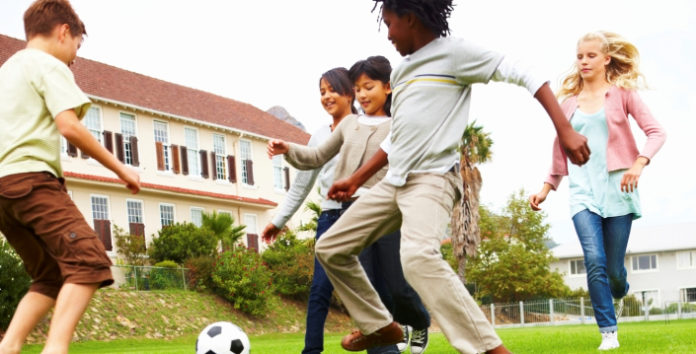
Engaging in an hour of of physical activity after school every day is not only beneficial for children’s physical health, but may also improve their cognitive functioning, a new study shows.
The research team, led by Dr. Charles Hillman of the University of Illinois at Urbana-Champaign, published their findings in the journal Pediatrics.
The US Department of Health and Human Services recommends that children and adolescents aged 6-17 years engage in at least 60 minutes of physical activity a day. But last year, a survey of high school students found that only 29% had met this recommendation within the last 7 days.
It is well documented that regular physical activity in childhood and adolescence has numerous benefits for short-term and later-life health. Being physically active can help build healthy bones and muscles, help control weight, and even improve cholesterol levels and blood pressure.
But increasingly, studies are finding that the positive effects of physical activity can also lead to improvements in children’s brain function. In a 2012 study, for example, researchers found that just 20 minutes of exercise a day may boost academic performance in children with attention-deficit hyperactivity disorder (ADHD).
And last year, researchers from Kings College London in the UK found that regular exercise as a child may improve cognitive functioning later in life.
In this latest study, Dr. Hillman and his colleagues found that children who took part in at least an hour of exercise after school showed improvements in attention, were better able to avoid distractions, and had a greater ability to switch between cognitive tasks compared with children who did not take part in the program.
FITKids
The researchers enrolled 221 children aged 7-9 years into their 9-month study. Half of the children were randomly assigned to an after-school physical activity program and the rest were placed on a wait list to act as controls.
The intervention, called FITKids, was based on the CATCH exercise program, a research-based health promotion initiative that was initially funded by the National Institutes of Health and now is used by schools and health departments across the U.S.
“Those in the exercise group received a structured intervention that was designed for the way kids like to move,” Dr. Hillman explains. “They performed short bouts of exercise interspersed with rest over a two-hour period.”
The children wore heart monitors and pedometers during exercise, and both the exercise group and control group underwent brain imaging and cognitive testing at study baseline and at the end of the study.
Exercise program ‘improved children’s attentional inhibition, cognitive flexibility’
As expected, fitness increased most in the intervention group over the course of the study.
“We saw about a six percent increase in fitness in children in the FITKids intervention gr-oup,” says Dr. Hillman. Fitness improved less than one percent in the wait-list control group, he adds.
However, children in the exercise group also demonstrated substantial increases in “attentional inhibition,” a measure of their ability to block out distractions and focus on the task at hand. They also improved in “cognitive flexibility,” which involves switching between intellectual tasks while maintaining speed and accuracy. Children in the wait-list control group saw minimal improvements in these measures, in line with what would be expected as a result of normal maturation over the nine months, the team found.
“Kids in the intervention group improved two-fold compared to the wait-list kids in terms of their accuracy on cognitive tasks,” adds Prof. Hillman. “And we found widespread changes in brain function, which relate to the allocation of attention during cognitive tasks and cognitive processing speed. These changes were significantly greater than those exhibited by the wait-list kids.”
The researchers note that the overall improvements in cognitive functioning seen among the exercise group were also associated with increased attendance to the program, such that greater attendance was related to greater change in brain function and cognitive performance.
“These findings demonstrate a causal effect of a physical activity program on executive control, and provide support for physical activity for improving childhood cognition and brain health,” the researchers conclude.
The study did not distinguish improvements that were the result of increased fitness from those that might stem from the social interactions, stimulation and engagement the children in the intervention group experienced, notes Dr. Hillman. However, other research, led by Catherine Davis at Georgia Regents University, has actually used social game-playing as a control group. These studies show that the cognitive effects of their physical activity intervention are above-and-beyond those that are gained just through social interactions, says Dr. Hillman.
The FITKids program is designed to get children socially engaged in exercise, which is part of what makes it an effective intervention, the team says.
“The fact is that kids are social beings; they perform physical activity in a social environment,” he said. “A big reason why kids participate in a structured sports environment is because they find it fun and they make new friends. And this intervention was designed to meet those needs as well.”
And it’s not only children’s brains that may benefit from physical activity. Recent research indicates that aerobic exercise in adults may protect brain function, while yoga has been found to boost the cognitive ability of sedentary seniors.
